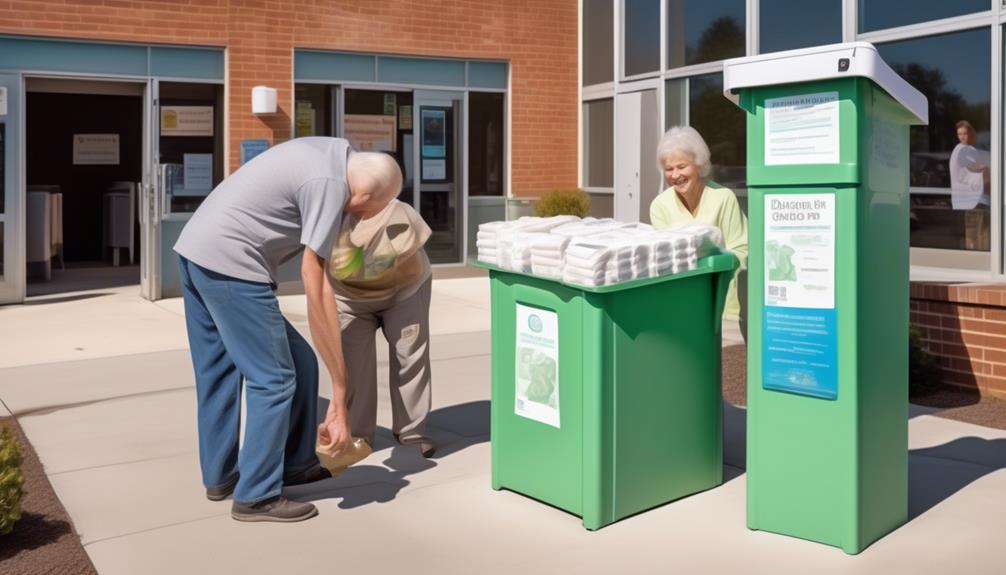In today’s fast-paced world, the responsibilities of caregiving can become daunting. The concept of mindfulness, recognized for its ability to reduce stress and improve mental health, has become increasingly popular.
As caregivers, we often find ourselves juggling numerous responsibilities while trying to provide the best care possible. But what if there was a way to approach these challenges with greater clarity and resilience?
Harnessing mindfulness may just be the key to unlocking a more balanced and fulfilling caregiving experience.
Key Takeaways
- Mindfulness enhances cognitive function and emotional regulation for caregivers.
- Regular mindfulness practice reduces stress levels and promotes emotional balance.
- Implementing mindfulness in daily routines leads to improved well-being.
- Mindfulness fosters emotional resilience and quality care for caregivers and recipients.
Understanding Mindfulness Practices
In our caregiving journey, understanding mindfulness practices can be a powerful tool for cultivating resilience and finding moments of peace amidst the challenges we face. Mindfulness practices, such as Mindfulness Meditation and Mindful Breathing, offer caregivers a way to anchor themselves in the present moment, allowing for better stress management and improved mental health. By engaging in these techniques, caregivers can enhance their cognitive functioning, emotional regulation, and overall well-being.
Mindfulness is more than just a trendy practice; it's a scientifically proven method for reducing stress levels and promoting emotional balance. Caregivers who incorporate mindfulness into their daily routines often report feeling calmer and more equipped to handle the demands of their role. This approach not only benefits the caregiver but also has a positive impact on the quality of care they provide to their loved ones.
As caregivers, embracing mindfulness practices can lead to a profound shift in how we navigate the complexities of our responsibilities. By staying present and grounded in the moment, we can better serve both ourselves and those we care for.
Techniques for Cognitive Decline

Practicing mindfulness techniques regularly offers a powerful strategy for enhancing cognitive function and addressing the challenges of cognitive decline with compassion and resilience. Mindfulness practices like Mindfulness Meditation and Mindful Breathing can be instrumental in slowing cognitive decline by promoting mental clarity and focus.
These techniques not only aid in memory retention and decision-making skills but also play a vital role in reducing stress, a key factor in preventing cognitive decline. By integrating mindfulness exercises into daily routines, individuals can improve neural plasticity and cognitive reserve, contributing to a healthier brain and potentially slowing down cognitive decline.
This proactive approach supports cognitive function, mental acuity, and overall brain health. Embracing mindfulness as a caregiver can provide valuable support in assisting individuals at risk of cognitive decline, offering a compassionate and effective way to enhance cognitive abilities and promote well-being.
Mindfulness for Stress Reduction
When facing stress, incorporating mindfulness practices like meditation and deep breathing can offer significant relief and support in maintaining emotional well-being. As caregivers, it's crucial to prioritize our own mental health to better care for others. Here are three ways mindfulness can help reduce stress:
- Stress Reduction: Mindfulness techniques have been proven to lower stress levels by activating the parasympathetic nervous system, which reduces stress hormones and blood pressure. Taking a few minutes each day to practice mindfulness can have a profound impact on our overall well-being.
- Emotional Regulation: Mindfulness-based interventions can help caregivers manage psychological stress and improve emotional well-being. By cultivating awareness of our thoughts and emotions in the present moment, we can better respond to challenging situations with clarity and compassion.
- Coping Mechanism: Incorporating mindfulness into our daily routines provides a valuable coping mechanism for dealing with the pressures of caregiving. Mindfulness empowers us to navigate stressors more effectively, promoting resilience and a sense of calm amidst chaos.
Benefits of Mindfulness in Caregiving

Mindfulness in caregiving offers a transformative approach to nurturing both the caregiver and the recipient, fostering emotional resilience and enhancing overall well-being. Caregivers supporting individuals with dementia face unique challenges that can impact their emotional well-being. By incorporating mindfulness practices into their caregiving routines, caregivers can experience a reduction in emotional reactivity and effectively manage chronic stress, leading to improved psychological well-being. For dementia patients, the benefits are equally significant, with mindfulness interventions shown to slow cognitive decline and enhance their quality of life. Research indicates that mindfulness not only provides emotional support and resilience for caregivers but also positively impacts the psychological well-being of dementia patients. Below is a table summarizing the key benefits of mindfulness in caregiving:
| Benefits of Mindfulness in Caregiving |
|---|
| Slows cognitive decline |
| Reduces emotional reactivity |
| Enhances overall well-being |
Implementing Mindfulness in Daily Routine
In our daily routines, incorporating mindfulness practices can profoundly enhance our well-being and reduce stress levels significantly. Mindfulness isn't just a fleeting trend but a powerful tool that can transform how we experience each day.
Here are three simple ways to implement mindfulness in your daily routine:
- Morning Routine Mindfulness: Start your day with a mindfulness practice like deep breathing or a short meditation session. This sets a positive tone for the day ahead, promoting clarity and emotional balance.
- Mindful Task Engagement: Practice mindfulness while engaging in routine tasks like washing dishes or taking a walk. Focus on the sensations, thoughts, and emotions that arise in the present moment, cultivating a sense of calm and presence.
- Evening Reflection Practice: Before bed, take a few moments to reflect on your day with kindness and curiosity. This practice promotes self-awareness, emotional regulation, and can help you unwind for a restful night's sleep.
Frequently Asked Questions
Why Mindfulness Is Good for Caregivers?
Mindfulness is beneficial for caregivers because it helps us manage stress, regulate emotions, and improve our overall well-being. By practicing mindfulness, we develop tools to navigate challenging situations with compassion and resilience.
This practice promotes self-care and enhances our ability to provide quality care to others. Mindfulness empowers us to slow down, stay present, and cultivate a sense of peace amidst the demands of caregiving.
How Can Mindfulness Be Used to Reduce Stress?
When it comes to reducing stress, mindfulness offers a powerful tool. By focusing on the present moment and acknowledging our thoughts without judgment, we can cultivate a sense of calm and clarity.
Mindfulness practices like meditation and deep breathing help us relax, lowering stress hormones and blood pressure. These techniques empower us to navigate life's challenges with resilience and emotional balance, ultimately enhancing our overall well-being.
Does Mindfulness Help Prevent Dementia?
Yes, mindfulness can help prevent dementia.
Research suggests that mindfulness practices can support healthy brain aging, potentially delaying the onset or progression of dementia. By enhancing attention, memory, and executive functions, mindfulness techniques aid in preventing cognitive decline.
Incorporating mindfulness into daily routines is crucial for maintaining cognitive health and reducing the risk of developing dementia. It's an empowering tool in the fight against cognitive decline.
Is Mindfulness a CBT Strategy?
Mindfulness isn't a Cognitive Behavioral Therapy (CBT) strategy; rather, it complements CBT by fostering awareness and acceptance of thoughts and feelings. CBT targets changing negative thought patterns, while mindfulness emphasizes being present and non-judgmental.
Combining both can enhance therapy outcomes by addressing cognitive distortions and promoting emotional regulation. By integrating mindfulness practices like meditation into CBT sessions, individuals can increase self-awareness and reduce stress.
Conclusion
As we navigate the challenging waters of caregiving, let's remember that mindfulness is our guiding star, illuminating the path to clarity and peace.
By embracing mindfulness practices, we can slow cognitive decline, reduce stress, and cultivate a sanctuary of tranquility for ourselves and our loved ones.
Let's harness the power of mindfulness to nurture our minds and hearts, creating a ripple of calm that flows through every moment we share.









